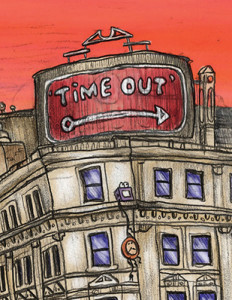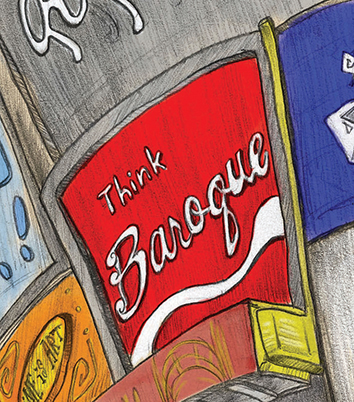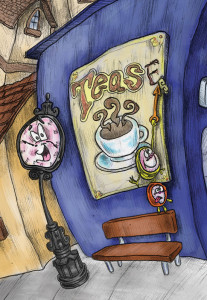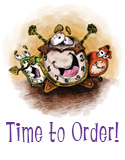Below are some words and expressions from Misbehaving Clocks that might be new to young readers. In italics next to the definitions, notice different types of questions (factual, interpretive, viewpoint, speculative and creative-thinking questions) that relate to how the words and expression are used in the story.
Timely Words
Acrobat – An athlete who performs acts requiring skill and agility and coordination. What are some of the acrobatic stunts the clocks do?
Baroque – A period of artistic style that used exaggerated motion and clear, easily interpreted detail to produce drama, tension, exuberance, and grandeur in sculpture, painting, architecture, literature, dance and music. In Baroque music there is a love of ornamentation (fancy sounds, such as trills). Baroque art features “exaggerated lighting, intense emotions, release from restraint, and even a kind of artistic sensationalism” (http://en.wikipedia.org/wiki/Baroque). In Piccadilly Circus, one of the lighted signs reads, “Think Baroque.” It is a spoof on a popular cola company’s slogan. How might this Baroque reference relate to the story’s illustrations and music? Note: The piccolo plays a Baroque variation of “Dance to Your Daddy” during the Piccadilly Circus section. Also, “Le CouCou,” which is a major theme in the musical reprise at the end of the story, is a Baroque piece by the French composer Louis-Claude Daquin.
Chalet – A type of wooden house of Swiss origin. Who lives in the chalet?
Cheeky – Saucy, bold. What are some things Red does that are cheeky?
Cheerio – Good-bye (British) Who says this? For the fun of it, say “Cheerio” to friends and family the next time you say good-bye!
Circus – An open circular place where several streets come together (British); a show that features a variety of acts including feats of physical skill, performances by clowns and daring acts. How does “circus” have a double meaning in the story?
Dub – To raise (someone) to knighthood; to call by a distinctive title or nickname. Knights have the title of Sir. Who were dubbed clock-knights? If you were made a knight, what would your name be? [Put Sir in front of your own name, your nickname or a made-up name.]
Hullabaloo – Uproar, loud confused noise What caused the hullabaloo?
Miniature – Small or reduced size. What is miniature in the story? Do you see anything on the upper shelf in the clock shop that is also miniature?
Misbehave – To disregard rules or behave badly; to clown or fool around. The clocks misbehave in different ways. Point to (or name) some of the things that the clocks do that would be considered a bad or mean kind of misbehaving. Point to some of the clocks’ actions that might be seen as a fun kind of misbehaving. It’s possible that some might see certain behavior differently. For instance, some might think that when the clock adds an “e” to Teas on the billboard on the side of Digital World that it is simply clowning around and others might view it as destroying property.
Noble – Impressive in appearance; distinguished by rank or title; of high moral character. Why is Big Ben noble? Try to think of more than one reason.
Pendulum – A swinging weight under the action of gravity that helps clocks keep regular time. Point to the clocks that have pendulums.
Squabble – To quarrel or argue noisily and usually over petty things. What kinds of things might clocks squabble over?
Tease – To make fun of; to annoy or pester; to joke around. In one of the story illustrations, there is a play on words (pun) with the words “teas” and “tease.” See the image below. Why is this clever or funny as it relates to what the clocks are doing?
Timely Expressions (Idioms)
Call it a day – Stop one’s activity or work for the day; quit temporarily. In the story, who calls it a day?
Go cuckoo – Go crazy or become wildly enthusiastic about something. Who goes cuckoo?
Have someone’s word – Have someone’s promise. Who makes a promise?
Ruffle someone’s feathers – Do something to cause confusion, agitation, irritation or annoyance in that person. Who ruffles feathers? Try to name more than one character. And who becomes irritated or annoyed? Again, name more than one character.

Run late – Be behind schedule and therefore likely to be late. Because the clocks come to life, how can this have more than one meaning?
Time-out – A short break from work or play; also, a form of discipline for misbehavior in young children in which they are briefly separated from the group to be quiet and reflect on what they did. What kind of work do clocks do that they might want a break from? Why do the clocks need both kinds of time-outs at different points in the story?
When the cat’s away, the mice will play – When no one in authority is present, those under that person’s rule will enjoy their freedom. How does this apply to the story? How can this apply to children when grown-ups are away?




